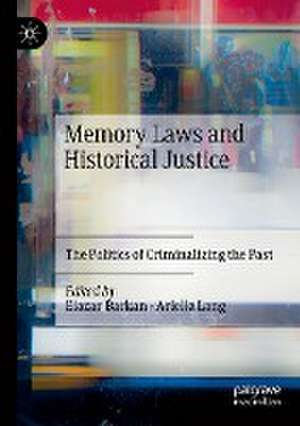Memory Laws and Historical Justice: The Politics of Criminalizing the Past
Editat de Elazar Barkan, Ariella Langen Limba Engleză Paperback – 2 oct 2023
This book examines state efforts to shape the public memory of past atrocities in the service of nationalist politics. This political engagement with the 'duty to remember', and the question of historical memory and identity politics, began as an effort to confront denialism with regard to the Holocaust, but now extends well beyond that framework, and has become a contentious subject in many countries. In exploring the politics of memory laws, a topic that has been overlooked in the largely legal analyses surrounding this phenomenon, this volume traces the spread of memory laws from their origins in Western Europe to their adoption by countries around the world. The work illustrates how memory laws have become a widespread tool of governments with a nationalist, majoritarian outlook. Indeed, as this volume illustrates, in countries that move from pluralism to majoritarianism, memory laws serve as a warning – a precursor to increasingly repressive, nationalist inclinations.
| Toate formatele și edițiile | Preț | Express |
|---|---|---|
| Paperback (1) | 640.37 lei 6-8 săpt. | |
| Springer International Publishing – 2 oct 2023 | 640.37 lei 6-8 săpt. | |
| Hardback (1) | 645.79 lei 6-8 săpt. | |
| Springer International Publishing – oct 2022 | 645.79 lei 6-8 săpt. |
Preț: 640.37 lei
Preț vechi: 753.39 lei
-15% Nou
Puncte Express: 961
Preț estimativ în valută:
122.54€ • 128.20$ • 101.79£
122.54€ • 128.20$ • 101.79£
Carte tipărită la comandă
Livrare economică 02-16 aprilie
Preluare comenzi: 021 569.72.76
Specificații
ISBN-13: 9783030949167
ISBN-10: 3030949168
Ilustrații: XII, 336 p. 2 illus.
Dimensiuni: 148 x 210 mm
Greutate: 0.42 kg
Ediția:1st ed. 2022
Editura: Springer International Publishing
Colecția Palgrave Macmillan
Locul publicării:Cham, Switzerland
ISBN-10: 3030949168
Ilustrații: XII, 336 p. 2 illus.
Dimensiuni: 148 x 210 mm
Greutate: 0.42 kg
Ediția:1st ed. 2022
Editura: Springer International Publishing
Colecția Palgrave Macmillan
Locul publicării:Cham, Switzerland
Cuprins
Chapter 1: Mapping Memory Laws.- Chapter 2: French Laws for a Better Past.- Chapter 3: “(De) Criminalizing the Past: Spain’s Legal Response to History, Memory, and Historical Memory.- Chapter 4: Polish Memory Laws and the Distortion of the History of the Holocaust.- Chapter 5: Legislating Historical Memory in Post-Soviet Ukraine.- Chapter 6: Holocaust Remembrance, the Cult of the War, and Memory Law in Putin’s Russia.- Chapter 7: Protecting Memory or Criminalizing Dissent? Memory Laws in Lithuania and Latvia.- Chapter 8: Criminalizing Denial as a Form of Erasure: The Polish-Ukrainian-Israeli Triangle.- Chapter 9: Memory Laws: The Continuation of Yugoslav Wars by Other Means.- Chapter 10: Communism v. National Socialism: Legislation as a Tool of Selective Historical Narrative in Hungary.- Chapter 11: The Perils and Limits of Memory Laws: The Case of Israel’s ‘Nakba Law’ (2011).- Chapter 12: Memory Law and the Duty to Rememberthe ‘1994 Genocide Against the Tutsi’ in Rwanda.
Notă biografică
Elazar Barkan is Professor of International and Public Affairs and the Director of the Human Rights Concentration at Columbia University’s School of International and Public Affairs, USA. His research interests focus on human rights, the role of history in contemporary society and politics, and the response to gross historical crimes and injustices.
Ariella Lang is Associate Dean of Academic Affairs, Director of Undergraduate Research and Fellowships at Columbia College and a Lecturer at Columbia University’s Institute for the Study of Human Rights. Her research interests include minority rights and cultures, genocide studies, and the relationship between religion and nationalism.
Textul de pe ultima copertă
This book examines state efforts to shape the public memory of past atrocities in the service of nationalist politics. This political engagement with the ‘duty to remember’, and the question of historical memory and identity politics, began as an effort to confront denialism with regard to the Holocaust, but now extends well beyond that framework, and has become a contentious subject in many countries. In exploring the politics of memory laws, a topic that has been overlooked in the largely legal analyses surrounding this phenomenon, this volume traces the spread of memory laws from their origins in Western Europe to their adoption by countries around the world. The work illustrates how memory laws have become a widespread tool of governments with a nationalist, majoritarian outlook. Indeed, as this volume illustrates, in countries that move from pluralism to majoritarianism, memory laws serve as a warning – a precursor toincreasingly repressive, nationalist inclinations.
Caracteristici
Examines memory laws as a relatively new category of laws that aim to shape the way a government views the past Traces the spread of memory laws from their origins in Western Europe to their adoption by countries around the world Demonstrates how memory laws often exceed their initial,
